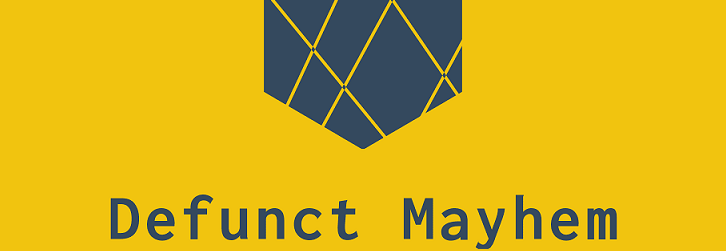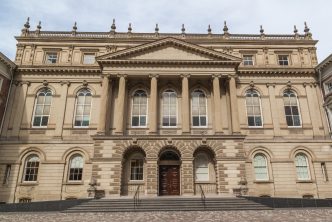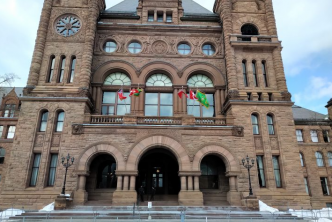UPDATE November 22nd:
The Canadian Federation of Students (CFS) and York Federation of Students (YFS) held a joint press conference in the Queen’s Park press room – sponsored by NDP MPP Chris Glover – to discuss the legal win against the province of Ontario in the Ontario Divisional Court that ruled the Student Choice Initiative unlawful.
The full uncut press conference can be seen here:
Kayla Weiler, the CFS-Ontario National Executive Representative, said “our democracy is valid” when discussing the right of students to determine what organizations the student body funds.
This verdict from the Divisional Court is a result of a unanimous decision by the panel of three judges. They ruled that the province of Ontario was “unlawful” with its “so-called student choice initiative” according to Goldblatt Partners, the law firm representing the student groups.
Weiler says the province has 45 days to appeal. Students in Ontario will know if the decision is set-in-stone by January 6th 2020.
Also featured at the press conference was NDP MPP Chris Glover the Official Opposition Critic for Colleges and Universities in Ontario. Glover said “this is the best news I’ve heard all year,” and, while at the podium, said that Ford should be on the hook for the fees that students opted out of since the court’s verdict was “unequivocal.”
UPDATE November 21st:
A panel of judges at the Ontario Divisional Court ruled unanimously that the Student Choice Initiative policy was unlawful.
In a quoted statement from the CFS’s press package, Kayla Weiler, Ontario representative of the Canadian Federation of Students said “Today the Ontario Divisional Court has confirmed what students already knew: The Student Choice Initiative is unlawful, and the Ford government acted beyond their authority. Doug Ford’s attempt to wipe out students’ unions under the guise of giving students ‘choice’ has been exposed for what it really was: an attempt to silence his opposition,”
In an email to student groups sent out Thursday evening, Felipe J. Nagata, Chairperson of the Canadian Federation of Students, Ontario said “So far, there are very few details to be shared, but we will keep you folks updated as we find out more.”
The CFS also announced a joint press conference with the York Federation of Students and their legal representation Goldblatt Partners.
The article will be updated as new details emerge.
Original article November 19th:
Literature created by the CFS-Ontario as part of their We the Students campaign.
The Canadian Federation of Students – Ontario and the York Federation of Students are currently embroiled in legal proceedings with the province of Ontario.

The Canadian Federation of Students has alleged that the “Student Choice Initiative,” part of the post-secondary tuition framework published by Ontario’s government in April 2019 is in conflict with section seven of the Ontario College of Applied Arts and Technology Act and undermines the autonomy of student organizations through the prevention of fee collection.
The Student Choice initiative is one prong of a three-pronged policy change from the Ford government. It allows students in post-secondary institutions to opt-out of democratically decided auxiliary fees.
In January 2019, the province of Ontario announced its intention to mandate a 10% reduction to domestic student tuition. This move was briefly praised before an announcement that detailed the reduction of the Ontario Student Assistance Program’s (OSAP) grants, and the eradication of the free tuition for students from low-income households.
In the summer of 2019, the CFS filed an injunction alongside the York Federation of Students against the government policy, claiming that parts of the post-secondary platform that had been ushered in by Merrilee Fullerton were in conflict with section seven of the Ontario College of Applied Arts and Technology.
In the CFS media advisory prior to the court date, the key facts being contested are listed:
- The SCI has arbitrarily deemed certain ancillary fees non-essential and optional for students, including students’ union membership, campus media, food banks and LGBTQ support centres.
- The vast majority of ancillary fees have been deemed essential and remain mandatory, including fees for athletics, student ID’s, and technology upgrades.
- The SCI has been applied inconsistently across institutions, leading to widespread and unnecessary confusion for students and institutions.
- Why does it matter?
For decades, students at post-secondary institutions in Ontario have paid ancillary fees on top of their tuition. These additional fees were decided two main ways. Either the institution would introduce new fees to fund some sort of service, or the student body would vote on a referendum question that would be recognized by the institution and be charged alongside tuition.
As of April 2019, there were about 830,000 students enrolled in colleges and universities across Ontario (both part-time and full-time).
Primarily, student fees voted on by students funded something student focused. Oftentimes, this meant that new services not being offered by the institution or clubs that students recognized the need for would be able to form (health insurance, transit passes, legal/tenancy help, music/speaker events, student space, insurance for clubs, on-campus restaurants, student food-banks, DIY bike centres, SafeWalk programs, equity-based clubs, and Student governments to name a few things).
The fees voted on in referendum routines could (and still can) be revoked in an equally democratic vote.
It’s not a mystery that the price of post-secondary tuition has been steadily increasing over the past fifty years, but ancillary fees were not, and still aren’t, the primary issue affecting the affordability of education.
For example, here is a comparison of the ancillary fees Sheridan students have the option of opting out of as of November 2019. The mandatory to optional ratio is negligible in the grand scheme of things, but the weight of the services that are now at risk of being reduced is significant.
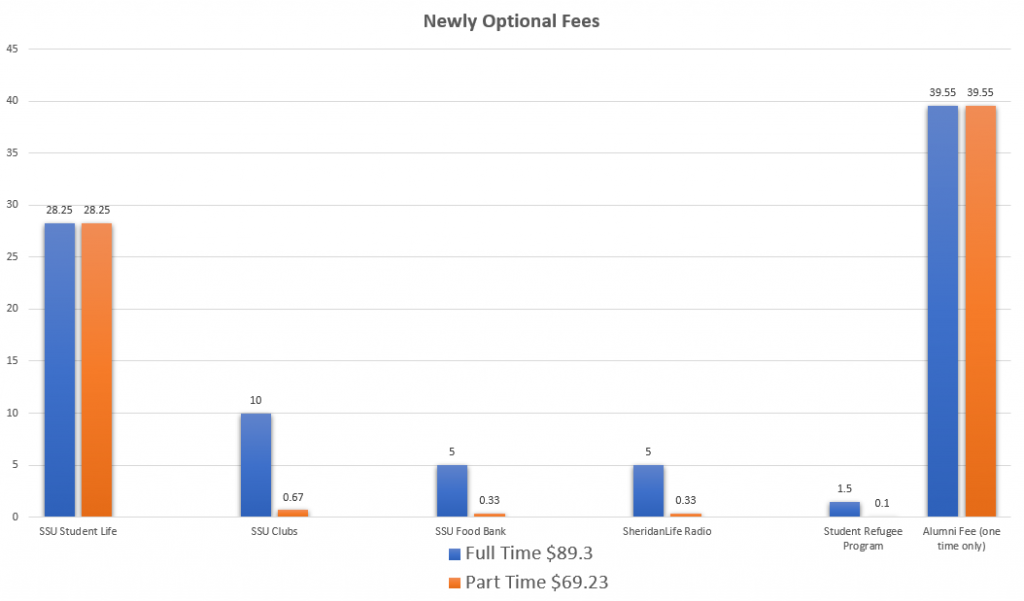
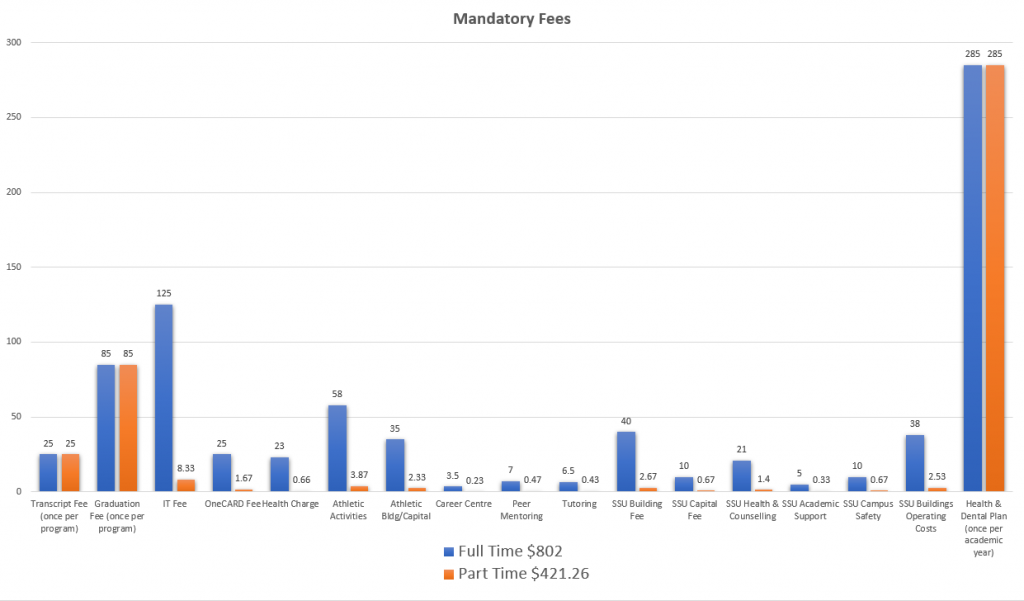
With the SCI, the Ford government is not actually making it easier for students to save money. Those students who use the services provided through the funding that comes from optional ancillary fees are being set up to suffer financially or socially.
For a more in-depth discussion about student fees in Ontario and the realities of our education, listen to the full interview with Kayla Weiler on the Defunct Mayhem podcast: HERE
